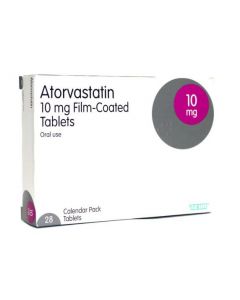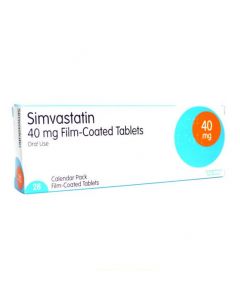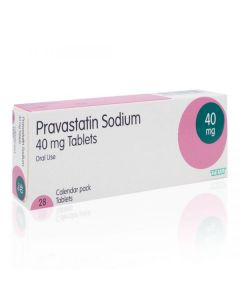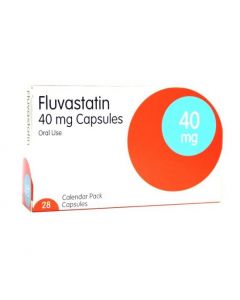High Cholesterol
Treatments
-
 Atorvastatin TabletsFrom As low as £14.99
Atorvastatin TabletsFrom As low as £14.99Buy Atorvastatin tablets online to help lower high cholesterol
-
 SimvastatinFrom As low as £12.99
SimvastatinFrom As low as £12.99- Lowers the bodies production of bad cholesterol
- Lowers the risk of heart problems such as heart disease, heart attacks as well as strokes
- Lipid-lowering medication that belongs to the statins class of drugs
Please note brand received may vary
-
 Pravastatin TabletsFrom As low as £12.99
Pravastatin TabletsFrom As low as £12.99- Decreases bad cholesterol levels whilst increasing good cholesterol levels
- Very effective in treating high cholesterol
- Lowers the risk of more serious issues such as stokes, heart attacks and heart disease
Please note brand received may vary
-
 Fluvastatin 20mg and 40mg TabletsFrom As low as £15.99
Fluvastatin 20mg and 40mg TabletsFrom As low as £15.99- Lowers Cholesterol
- Reduces the amount of bad cholesterol produced by the Liver
- Can help to reduce the risk of stokes, heart attacks and heart disease
Please note brand received may vary
What is High Cholesterol?
Cholesterol, which is known as a lipid, is a substance that is found in your body and in certain foods. In the right levels, it keeps your body functioning in a healthy and normal way. However, if you have an excessively high level of these lipids, it can lead to serious health conditions such as heart attacks and strokes.
This excess of cholesterol, which lives in your blood, clogs up your arteries and makes it harder for blood to pump around your body and reach vital organs such as your heart. Blood clots can also form, which can cut off the blood flow or break away and become lodged elsewhere, causing a stroke or heart attack.
High cholesterol can also lead to coronary heart disease, heart failure, angina, mini-strokes (TIAs), vascular dementia and peripheral arterial disease (PADs).
High Cholesterol Treatment
If you are diagnosed with high cholesterol, the first step is to make changes to your diet and lifestyle. You will need to exercise more often, stop drinking excessively, stop smoking altogether and eat healthier foods. High cholesterol foods include those high in saturated fat, including fatty meats or meat products, butter, lard, cream, cheese and sugar. These should be replaced with healthier foods like fruit and vegetables. However, if after a few months your levels haven’t reduced to a lower level, you may need high cholesterol medication.
Statins cholesterol lowering medication
Medication like statins are an effective method of lowering cholesterol, but for it to be fully beneficial, the patient must also make the decision to commit to healthy lifestyle choices. This is the biggest factor in lowering cholesterol levels.
Statins block a type of chemical called an enzyme, which makes cholesterol. Once blocked, the level of cholesterol in your blood goes down. Some people are intolerant to statins, suffering side effects like headaches and stomach problems.
Statins must be taken for life, as cholesterol levels will rise once again after the medication is stopped. For that reason, statins are only prescribed to people with a high risk of heart disease.
Can you buy Statins over the counter?
Statins cannot be bought over the counter as they require ongoing monitoring of your cholesterol levels by a doctor or pharmacist.
You can buy statins online from medicine direct following an online consultation with one of our UK based prescribers. We stock the following statins:
Alternative treatments for High Cholesterol
Steps like stopping smoking, losing weight if you are obese and cutting down on how much alcohol you drink are small sacrifices for the sake of your body’s health.
Becoming more active and ensuring you get at least 30 minutes of exercise every day will also go a long way towards lowering your cholesterol levels. Improve your diet by cutting out fried foods; try microwaving, boiling or steaming foods instead. Replace fatty foods with high-fibre and low-fat alternatives, including plenty of fresh fruit and vegetables, nuts, wholemeal bread, muesli and fish that is high in omega-3.
High cholesterol treatment prices (UK)
| Statin | Quantity | Price (starting from) |
| Fluvastatin 20mg | 28 Capsules | £15.99 |
| Fluvastatin 40mg | 28 Capsules | £16.99 |
| Pravastatin 10mg | 28 Tablets | £12.99 |
| Pravastatin 20mg | 28 Tablets | £12.99 |
| Pravastatin 40mg | 28 Tablets | £13.99 |
| Simvastatin 10mg | 28 Tablets | £12.99 |
| Simvastatin 20mg | 28 Tablets | £12.99 |
| Simvastatin 40mg | 28 Tablets | £12.99 |
| Simvastatin 80mg | 28 Tablets | £12.99 |
| Atorvastatin 10mg | 28 Tablets | £14.99 |
| Atorvastatin 20mg | 28 Tablets | £14.99 |
| Atorvastatin 40mg | 28 Tablets | £15.99 |
| Atorvastatin 80mg | 28 Tablets | £15.99 |
Doctor Notes
Statins are typically the go to treatment when it comes to lowering cholesterol levels. Statins are proven to effectively treat high cholesterol, however they should be taken alongside adopting a variety of lifestyle changes for them to be most effective.
All of the statins treatments that we sell at Medicine Direct are sourced from UK wholesalers and are clinically proven to help manage cholesterol levels effectively.
Sonia Khan
MPharm: 2076091
Pharmacist
This content has been written by Pharmacist Sonia Khan and has been medically reviewed byHussain Abdeh
View Profile



